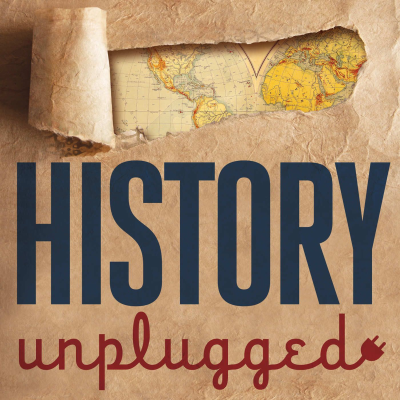
History Unplugged Podcast
Podcast de History Unplugged
Empieza 7 días de prueba
$99 / mes después de la prueba.Cancela cuando quieras.

Más de 1 millón de oyentes
Podimo te va a encantar, y no estás solo/a
Rated 4.7 in the App Store
Acerca de History Unplugged Podcast
For history lovers who listen to podcasts, History Unplugged is the most comprehensive show of its kind. It's the only show that dedicates episodes to both interviewing experts and answering questions from its audience. First, it features a call-in show where you can ask our resident historian (Scott Rank, PhD) absolutely anything (What was it like to be a Turkish sultan with four wives and twelve concubines? If you were sent back in time, how would you kill Hitler?). Second, it features long-form interviews with best-selling authors who have written about everything. Topics include gruff World War II generals who flew with airmen on bombing raids, a war horse who gained the rank of sergeant, and presidents who gave their best speeches while drunk.
Todos los episodios
1019 episodiosIt took little more than a single generation for the centuries-old Roman Empire to fall. In those critical decades, while Christians and pagans, legions and barbarians, generals and politicians squabbled over dwindling scraps of power, two men – former comrades on the battlefield – rose to prominence on opposite sides of the great game of empire. Roman general Flavius Stilicho, the man behind the Roman throne, dedicated himself to restoring imperial glory, only to find himself struggling for his life against political foes. Alaric, King of the Goths, desired to be a friend of Rome, was betrayed by it, and given no choice but to become its enemy. Battling each other to a standstill, these two warriors ultimately overcame their differences in order to save the empire from enemies on all sides. And when Stilicho fell, Alaric took vengeance on Rome, sacking it in 410, triggering the ultimate downfall of the Western Empire. To discuss this critical decade in Western history is Don Hollway, author of “At the Gates of Rome: The Fall of the Eternal City, AD 410.” See omnystudio.com/listener [https://omnystudio.com/listener] for privacy information.
It's been 80 years since the bombings of Hiroshima and Nagasaki, and the question of whether or not those bombings were justified has never been more contentious. That wasn't the case in the immediate aftermath: 85% of the American public approved the decision to bomb the cities in 1945, but this has dropped to 56% in more recent years, particularly among younger generations. Only 47% of 18- to 29-year-olds, versus 70% of those 65 and older—the World War II generation—thought it was justified, because there was no other way that Japan would surrender. But starting in the 1960s, newer generations of historians put forward revisionist histories. They argued that Japan was going to surrender anyway, or they were trying to negotiate a surrender, but the United States ignored them. Alternatively, they would say that the purpose of the atomic bombings was to put the United States and its allies on a strong footing in the opening stages of the Cold War. It would scare Russia and show that it was overwhelmingly overmatched in an arms and technology fight. Today's guest is one of the last nuclear-trained bomber pilots in the Navy, who received training and delved deeply into what exactly to do if he had to drop a nuclear payload on a city, and he spent a lot of time pondering these very questions. His name is Lou Casabianca, and he's the author of the book “Hiroshima and Nagasaki and the Invasion of Japan: Case Closed.” He argues the decision to drop the bombs was the right one, and it's not a muddled issue. Incontrovertibly putting forth the case that, after all these decades since the bombings, the justification is largely the same as those made in 1945. We answer all the common objections to the dropping of the atomic bombs, what would have happened if they hadn't been used and the United States had to undertake an invasion of the Japanese mainland, and why these questions still matter today. See omnystudio.com/listener [https://omnystudio.com/listener] for privacy information.
The first year of the siege of Leningrad that began in September 1941 marked the opening stage of a 900-day-long struggle for survival that left over a million dead. The capture of the city came tantalizingly close late that year, but Hitler paused to avoid costly urban fighting. Determined to starve Leningrad into submission, what followed was a winter of unimaginable suffering for ordinary citizens and defenders alike. First-hand accounts from Soviet and German soldiers, many never previously published, together with those of the civilians trapped in the city detail the relentless specter of death which defined life in and around Leningrad. Today’s guest is Prit Buttar, author of “To Besiege a City: Leningrad 1941-42.” Personal vignettes give a glimpse into the reality of life in a city under siege. The teenage volunteer climbers, weak from hunger, scaling the slender spire of the Peter and Paul Fortress to shroud it in camouflage as the German bombers circle overhead like vultures. Or the soldier trombonist completing a long day on the front line to perform Shostakovich’s epic Seventh Symphony alongside a starving and sickly orchestra – an act of defiance broadcast to defenders and attackers alike. See omnystudio.com/listener [https://omnystudio.com/listener] for privacy information.
The most radical piece of legislation in the 20th century was Louisiana Governor Huey Long’s “Share Our Wealth Plan,” a bold proposal to confiscate individual fortunes exceeding $1 million to fund healthcare, free college education, and a guaranteed minimum income for families struggling through the Great Depression—a plan so radical it sparked theories that his 1935 assassination was orchestrated to silence his challenge to the economic elite. From his early days as a plain-speaking lawyer to his transformative tenure as governor and U.S. senator, Long’s media mastery, colorful antics—like coaching LSU football from the sidelines and delivering drunken speeches—and relentless fight against oligarchies cemented his reputation as the greatest politician of the 20th century. His influence on Roosevelt’s New Deal and parallels to modern figures like Donal Trump and Bernike Sanders reveal a recurring pattern of populist fervor in American politics. Join Scott as he discusses these themes with Thomas E. Patterson, author of “American Populist: Huey Long of Louisiana, to uncover how Long’s vision continues to resonate today.” See omnystudio.com/listener [https://omnystudio.com/listener] for privacy information.
“‘Rope!’ muttered Sam[wise Gamgee]. ‘I knew I’d want it, if I hadn’t got it!’” Sam knew in the Lord of the Rings that the quest would fail without rope, but he was inadvertently commenting on how civilization owes its existence to this three-strand tool. Humans first made rope 50,000 years ago and one of its earliest contributions to the rise of civilization was as a tool for domesticating animals for milk, meat, and work. ncient Egyptians were experts at making strong, three-strand rope from the halfa grass along the banks of the Nile. Rope allowed them to haul two-and-a-half ton limestone blocks to build the pyramids. They also used rope to tie together the planks of their graceful vessels that sailed without the need of a single nail. The Austronesian peoples spread across the islands of the Pacific in the most impressive and daring series of oceanic voyages in human history. And they did it using fast catamaran and outrigger boats held together with coconut fiber rope. Today’s guest is Tim Queeny, author of Rope: How a Bundle of Twisted Fibers Became the Backbone of Civilization. We look at the past, present, and future of this critical piece of technology. See omnystudio.com/listener [https://omnystudio.com/listener] for privacy information.

Rated 4.7 in the App Store
Empieza 7 días de prueba
$99 / mes después de la prueba.Cancela cuando quieras.
Podcasts exclusivos
Sin anuncios
Podcast gratuitos
Audiolibros
20 horas / mes























